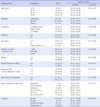Abstract
Purpose
The purpose of this study was to identify relationships of resilience, Post-Traumatic Stress Disorder(PTSD), and quality of life of breast cancer patients. The findings from this study would provide baseline data needed for nursing intervention.
Methods
A sample of 129 breast cancer patients was recruited from three hospitals in J and C cities in Korea. The survey was conducted with participants by utilizing self-reported questionnaires.
Results
Quality of life showed statistically significant differences on religion (t=2.11, p=.033) and hobby (t=2.79, p=.006). Resilience and PTSD had a negative correlation (r=-.22, p=.010). Resilience and quality of life of the participants had a positive correlation (r=.58, p<.001), whereas PTSD and quality of life had a negative correlation (r=-.45, p<.001). Significant predictors of quality of life were resilience and PTSD. These variables explained 44.9% of the variance in quality of life.
Figures and Tables
Summary Statement
▪ What is already known about this topic?
Resilience and quality of life and become increasingly relevant in cancer patents.
In survivors of adults cancers, post-traumatic stress disorder(PTSD) were negatively associated with quality of life.
▪ What this paper adds?
While resilience and PTSD have a negative correlation, resilience and quality of life are positively correlated, and PTSD and quality of life are nagatively correlated. Significant predictors of quality of life were resilience and PTSD.
▪ Implications for practice, education and/or policy
This study could form the basis for developing and applying nursing interventions to improve resilience and to relieve PTSD. Nurses should screen breast cancer patents with PTSD.
Promoting optimum quality of life in breast cancer patients, strategies for preventing PTSD and increasing resilience are needed.
References
1. Korea Brest Cancer Society. Breast cancer factors & figures in Korea[Internet]. Seoul: Korea Brest Cancer Society;2013. cited 2013 December 6. Available from: http://www.kbcs.or.kr/journal/file/2013_Breast_Cancer_Facts_and_Figures_updated.pdf.
2. National Cancer Information Center. Cancer information service [Internet]. Seoul: National Cancer Information Center;2013. cited 2013 November 5. Available from: http://www.cancer.go.kr/mbs/cancer/jsp/cancer/cancer.jsp?cancerSeq=4757&menuSeq=4762&viewType=all&id=cancer_020112000000.
3. Phillips KA, Osborne RH, Giles GG, Dite GS, Apicella C, Hopper JL, et al. Psychosocial factors and survival of young women with breast cancer: A population-based prospective cohort study. J Clin Oncol. 2008; 26(28):4666–4671.

4. Lee GN, Lee DS. Sexual experiences of women with breast cancer. J Korean Oncol Nurs. 2011; 11(3):201–220.

5. Fan G, Filipczak L, Chow E. Symptom clusters in cancer patients: A review of the literature. Curr Oncol. 2007; 14(5):173–179.

6. Dodd MJ, Cho MH, Cooper BA, Miaskowski C. The effect of symptom cluster on functional status and quality of life in women with breast cancer. Eur J Oncol Nurs. 2010; 14(2):101–110.
7. Mehnert A, Koch U. Prevalence of acute and post-traumatic stress disorder comorbid mental disorders in breast cancer patients during primary cancer: A prospective study. Psychooncology. 2007; 16(3):181–188.
8. Seligman ME, Csikszentmihalyi M. Positive psychology: An introduction. Am Psychol. 2000; 55(1):5–14.

9. Wagnild GM, Young HM. Development and psychometric evaluation of the resilience scale. J Nurs Meas. 1993; 1(2):165–178.
11. Oh PJ. Correlation between mental adjustment to cancer and anxiety. J Korean Oncol Nurs. 2009; 9(1):23–30.
12. Haase JE. The adolescent resilience model as a guide to interventions. J Pediatr Oncol Nurs. 2004; 21(5):289–299.

13. Irwin NS, Shariene AW, Tim SA. Resilience rather recovery. A contextual framework on adaption following bereavement. New York: The Free Press;2008.
14. Ryu YM, Yi MS. The factors influencing quality of life in women with breast cancer. Asian Oncol Nurs. 2013; 13(3):121–127.

15. Song YS. Determinants of resilience of the physically disabled at home [master's thesis]. Busan: Kosin University;2004.
16. Weiss D, Marmar C. The impact of event scale-revised. In : Wilson JP, Keane TM, editors. Assessing psychological trauma and PTSD. New York: Guilford Press;1997. p. 399–411.
17. Eun HJ, Kwon TW, Lee SM, Kim TH, Choi MR, Cho SJ. A study of reliability and validity on the korean version of impact of event scale. J Korean Neuropsychiatr Assoc. 2005; 44(3):303–310.
18. Brady MJ, Cella DF, Mo F, Bonomi AE, Tulsky DS, Lloyd SR, et al. Reliability and validity of the functional assessment of cancer therapy-breast quality-of-life instrument. J Clin Oncol. 1997; 15(3):974–986.

19. Lee EK. A study on factors affecting cancer patients. J Korean Acad Soc Nurs Educ. 2007; 13(1):52–58.
20. Kim JH. Resilience. Seoul: Seoul Wisdomhouse;2011.
21. Yang SK. The relationship between coping strategies, social support, and post-traumatic stress symptom in patients with breast cancer [master's thesis]. Jinju: Gyeongsang University;2012.
22. Andrykowski MA, Cordova MJ. Factors associated with PTSD symptom following treatment for breast cancer: A test of the Andersen model. J Trauma Stress. 1998; 11(2):189–203.
23. Andrykowski MA, Cordova MJ, McGrath PC, Sloan DA, Kenady DE. Stability and change in posttraumatic stress disorder symptoms following breast cancer treatment: A 1-year follow-up. Psychooncology. 2000; 9(1):69–78.

24. Amstadter AB, McCart MR, Ruggiero KJ. Psychosocial interventions for adults with crime-related PTSD. Prof Psychol Res Pract. 2007; 38(6):640–651.

25. Suh YO. Predictors of quality of life in women with breast cancer. J Korean Acad Nurs. 2007; 37(4):459–466.

26. Park JH, Jun EY, Kang MY, Joung YS, Kim GS. Symptom experience and quality of life in breast cancer survivors. J Korean Acad Nurs. 2009; 39(5):613–621.

27. Kwon EJ, Yi MS. Distress and quality of life in breast cancer survivors in Korea. Asian Oncol Nurs. 2012; 12(4):289–296.

28. Epplein M, Zheng Y, Zheng W, Chen Z, Gu K, Penson D, et al. Quality of life after breast cancer diagnosis and survival. J Clin Oncol. 2011; 29(4):406–412.

29. Choi KS, Park JA, Lee JH. The effect of symptom experience and resilience on quality of life in patients with colorectal cancers. Asian Oncol Nurs. 2012; 12(1):61–68.

30. Park EJ. Influencing factors of stress and resilience quality of life among women with thyroid cancer [master's thesis]. Daegu: Keimyung University;2013.




 PDF
PDF ePub
ePub Citation
Citation Print
Print






 XML Download
XML Download